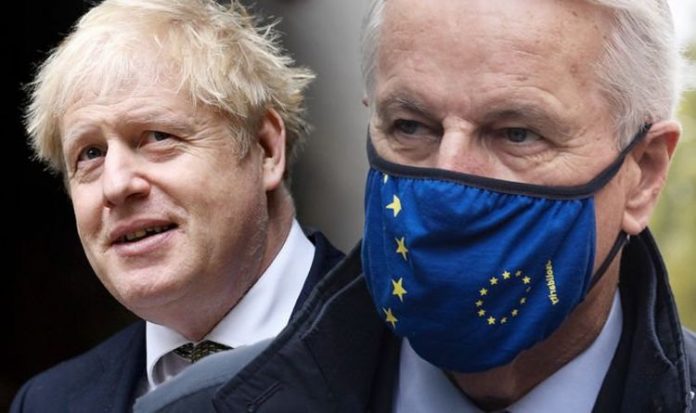Trade talks have resumed today in London as the EU’s negotiator Michel Barnier attempts to secure a deal with the UK post-Brexit. International Trade Secretary Liz Truss insisted today that a deal can still be done with the EU, as officials began a new round of “intensified” daily talks. Mr Barnier has warned that “every day counts” ahead of a looming December deadline. He said both sides share a “huge common responsibility”, but talks will need to push on quickly with the transition period ending at the end of this year.
So far talks have stalled over red lines on state aid, regulation and fisheries as the end of the transition period approaches.
French President Emmanuel Macron has stepped up fighting talk in recent weeks, saying that the UK needs Brussels more than Brussels needs the UK.
He said: “The British, no matter what was said to them during the referendum campaign, need the European single market.
“They are much more dependent on us than we are on them.”
However, while Mr Macron and figures in Brussels stand by their demands, one expert warned that the EU could be underestimating the UK.
A researcher at the Wilfried Martens Centre, the official think tank of the European People’s Party, claimed in 2019 that the UK could still enjoy some success after Brexit.
Eoin Drea wrote for the Irish Times: “The EU has also fatally overlooked two characteristics of the British economy that will help it mitigate the immediate negative impacts of Brexit.
“First, Britain – like all Anglo-Saxon economies – looks aghast at the oversized role of government in continental states.
“British public spending as a proportion of their economy stands at under 40 percent (even less in Ireland).
“The French spend in excess of 50 percent, the Germans about 45 percent.
READ MORE: Brexit: EU warned ‘UK must suffer’ outside bloc
However, Mr Drea warned that the EU must ensure the UK suffers a “knockout blow” if it is to protect the bloc’s reputation.
He added: “Brexit will have a detrimental impact upon Britain, but the longer-term impact of a successful Britain on Europe may be just as serious.
“That is why, for Europe to thrive, Brexit Britain must fail (and fail badly).”







